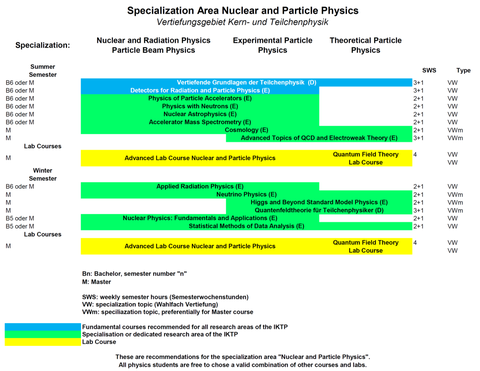Specialisation Nuclear and Particle Physics
The lecture programme is covering selected topics in experimental particles physics, in theoretical particle physics, in nuclear physics, and in particle beam physics. Many courses are combining experimental and theoretical concepts, e.g. the lectures on Fundamentals of Particle Physics, and in Cosmology.
The lab courses of the specialisation area Nuclear and Particle Physics are integrating experimental lab experiments and theoretical tutorials, which can be selected and combined in any desired combination. This allows learning more about different research areas offered at the IKTP before chosing a topic for the 1-year research phase of the Master course and for the Master thesis.
An overview of the lectures and lab courses which are offered to Bachelor and Master students in the specialization area Nuclear and Particle Physics are displayed below and available for download in pdf format .

Specialization Nuclear and Particle Physics
The Institute of Nuclear and Particle Physics offers participation in current fundamental research topics, like the study of electroweak symmetry breaking, the search for new Higgs bosons, super-symmetry and quantum field theory, nuclear and solar neutrino physics, and more. Applications are in the focus of our research in radiation physics, dosimetry, laser particle accelerator technologies, and accelerator mass spectroscopy. Moreover, you can learn about construction, testing and application of particle and radiation detectors and of detector electronics, as well as data analysis.
For Bachelor students starting a thesis in one of our groups, we offer programming courses for data analysis and simulations, or for programming of electonic circuits, depending on the topic of the thesis.
We offer a wide range of interesting topics for Bachelor and Master theses, which you may find online . After having completed the Master degree, there is the possibility for continuing your research activities as a Ph.D. student in one of our research groups.
The specialization area Nuclear and Particle Physics aims at a general qualification as a scientist, not only aiming at fundamental research, but also in industry and the public sector. The diverse and attractive work in international research groups will enlarge your competencies in solving complex problems in a team, and in dealing with competetive situations constructively. The unique work environment of an international research group brings together people of different cultures and countries and is coordinated and connected world-wide using all modern means of communication and advanced technological solutions, like grid and cloud computing.
